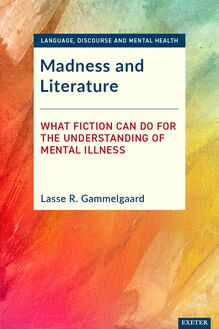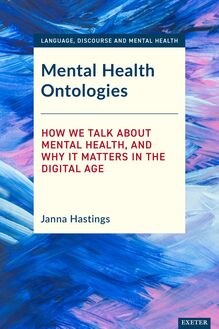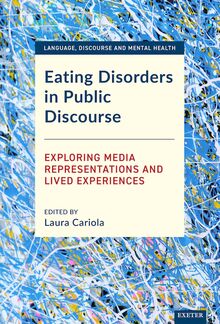-
 Univers
Univers
-
 Ebooks
Ebooks
-
 Livres audio
Livres audio
-
 Presse
Presse
-
 Podcasts
Podcasts
-
 BD
BD
-
 Documents
Documents
-
- Cours
- Révisions
- Ressources pédagogiques
- Sciences de l’éducation
- Manuels scolaires
- Langues
- Travaux de classe
- Annales de BEP
- Etudes supérieures
- Maternelle et primaire
- Fiches de lecture
- Orientation scolaire
- Méthodologie
- Corrigés de devoir
- Annales d’examens et concours
- Annales du bac
- Annales du brevet
- Rapports de stage
La lecture à portée de main
Vous pourrez modifier la taille du texte de cet ouvrage
Découvre YouScribe en t'inscrivant gratuitement
Je m'inscrisDécouvre YouScribe en t'inscrivant gratuitement
Je m'inscrisEn savoir plus
Vous pourrez modifier la taille du texte de cet ouvrage
En savoir plus

Description
Mental illness has been a favourite topic for authors throughout the history of literature, while psychologists and psychiatrists such as Sigmund Freud and Karl Jaspers have in turn been interested in and influenced by literature. Pioneers within philosophy, psychiatry and literature share the endeavour to explore and explain the human mind and behaviour, including what a society deems as being outside perceived normality.
Using a theoretical approach that is eclectic and transdisciplinary, this volume engages with literature’s multifarious ways of probing minds and bodies in a state of mental ill health. The cases and the theory are in dialogue with a clinical approach, addressing issues and diagnoses such as trauma, psychosis, bipolar disorder, eating disorders, self-harm, hoarding disorder, PTSD and Digital Sexual Assault.
The chapters in Part I address literary representations of madness with a historical awareness, outlining the socio-political potentials of madness literature. Part II investigates how representations of mental illness in literature can offer unique insights into the subjective experience of alternative states of mind. Part III reflects on how literary cases can be applied to help inform mental health education, how they can be used therapeutically and how they are giving credence to new diagnoses. Throughout the book, the contributors consider how the language and discourses of literature—both stylistically and theoretically—can teach us something new about what it means to be mentally unwell.
Introduction: Madness and Literature and the Health Humanities Lasse Raaby Gammelgaard
Part I: Literary History and Socio-Political Perspectives
1 Layla and Majnun in Historical and Contemporary Conceptions of Madness in Islamic Psychology Alan Weber
2 The Anti-Psychiatry Ethos in Samuel Beckett’s Murphy Shoshana Benjamin
3 Apartheid’s Garden: Dismantling Madness in J.M. Coetzee’s Life & Times of Michael K Sebastian C. Galbo
4 Sniffs and Dribblers: Poppy Shakespeare and the Identities of Madness Clare Allan
Part II: Literary Theory and Experiencing Mental Illness
5 Reading Shattering Minds and Extended Selves in Virginia Woolf’s Mrs Dalloway Anna Ovaska
6 Spill the Words: Speechlessness and Creativity in the Writing of Janet Frame Mary Elene Wood
7 Pronominal Shifts and the Confusion of Self with Not-Self Alice Hervé
8 Rethinking Clinical and Critical Perspectives on Psychosis in Kathy Acker’s Writing Charley Baker
9 Countering the DSM in Poetry about Bipolar Disorder Lasse Raaby Gammelgaard
10 Seeing Feeling: Dissociation and Post-Traumatic Memory in the Graphic Novel Perfect Hair Penni Russon
Part III: Literary Instrumentality and Clinical Psychopathology
11 Writing Therapy, Writing Data: Therapeutic Writing as a Methodological and Ethical Approach in Researching Digital Sexual Assault Signe Uldbjerg
12 A Question of Context: Sites for Cultural Negotiation in Narratives of Manic Depression Megan Milota
13 Conscripting Dante: History, Anachronism, and the Uses of Literary Precedents in the ‘New’ Diagnosis of Hoarding Disorder David Orr
14 Opening Up the Discourse of Male Eating Disorders: Personal Experience in German and English Narratives Heike Bartel
Afterword Lasse Raaby Gammelgaard
Notes
Index
Sujets
Informations
| Publié par | University of Exeter Press |
| Date de parution | 04 octobre 2022 |
| Nombre de lectures | 0 |
| EAN13 | 9781905816385 |
| Langue | English |
Informations légales : prix de location à la page 0,4900€. Cette information est donnée uniquement à titre indicatif conformément à la législation en vigueur.
Extrait
Madness and Literature
Language, Discourse and Mental Health
Series Editors :
Laura Cariola, Lecturer in Applied Psychology at the University of Edinburgh
Billy Lee, Lecturer in Psychology at the University of Edinburgh
Lisa Mikesell, Associate Professor of Communication at Rutgers University, USA
Michael Birch, Professor of English & Communications at Massachusetts College of Liberal Arts, USA
Mental Health Ontologies
How We Talk About Mental Health, and Why it Matters in the Digital Age
Janna Hastings, 2020
Madness and Literature
What Fiction Can Do for the Understanding of Mental Illness
ed. Lasse R. Gammelgaard, 2022
Eating Disorders in Public Discourse
Using Language-Based Approaches to Explore Media and Lived Experiences
ed. Laura Cariola, 2022
Madness and Literature
What Fiction Can Do for the Understanding of Mental Illness
Edited by Lasse Raaby Gammelgaard
First published in 2022 by
University of Exeter Press
Reed Hall, Streatham Drive
Exeter EX4 4QR, UK
www.exeterpress.co.uk
Copyright © Lasse Raaby Gammelgaard and the contributors 2022
The right of Lasse Raaby Gammelgaard and the contributors to be identified as authors of this work has been asserted by them in accordance with the Copyright, Designs and Patents Act 1988.
Language, Discourse and Mental Health
The publishers gratefully acknowledge the assistance of the Independent Research Fund Denmark in the publication of this volume.
British Library Cataloguing in Publication Data
A catalogue record for this book is available from the British Library.
https://doi.org/10.47788/PMMG3806
ISBN 978-1-90581-637-8 Hardback
ISBN 978-1-90581-638-5 ePub
ISBN 978-1-90581-639-2 PDF
Cover image: iStock.com/enjoynz
Every effort has been made to trace copyright holders and obtain permission to reproduce the material included in this book. Please get in touch with any enquiries or information relating to an image or the rights holder.
Typeset in Caslon and Myriad by Deanta Global Publishing Services, Chennai, India
Contents
Contibutors
Introduction: Madness and Literature and the Health Humanities
Lasse Raaby Gammelgaard (Aarhus University, Denmark)
Part I: Literary History and Socio-Political Perspectives
1 Layla and Majnun in Historical and Contemporary Conceptions of Madness in Islamic Psychology
Alan Weber (Weill Cornell Medical College, Qatar)
2 The Anti-Psychiatry Ethos in Samuel Beckett’s Murphy
Shoshana Benjamin (Ben-Gurion University of the Negev, Israel)
3 Apartheid’s Garden: Dismantling Madness in J.M. Coetzee’s Life & Times of Michael K
Sebastian C. Galbo (University of Buffalo—SUNY, USA)
4 Sniffs and Dribblers: Poppy Shakespeare and the Identities of Madness
Clare Allan (novelist)
Part II: Literary Theory and Experiencing Mental Illness
5 Reading Shattering Minds and Extended Selves in Virginia Woolf’s Mrs Dalloway
Anna Ovaska (Tampere University, Finland)
6 Spill the Words: Speechlessness and Creativity in the Writing of Janet Frame
Mary Elene Wood (University of Oregon, USA)
7 Pronominal Shifts and the Confusion of Self with Not-Self
Alice Hervé (writer and independent scholar)
8 Rethinking Clinical and Critical Perspectives on Psychosis in Kathy Acker’s Writing
Charley Baker (University of Nottingham, UK)
9 Countering the DSM in Poetry about Bipolar Disorder
Lasse Raaby Gammelgaard (Aarhus University, Denmark)
10 Seeing Feeling: Dissociation and Post-Traumatic Memory in the Graphic Novel Perfect Hair
Penni Russon (University of Technology Sydney)
Part III: Literary Instrumentality and Clinical Psychopathology
11 Writing Therapy, Writing Data: Therapeutic Writing as a Methodological and Ethical Approach in Researching Digital Sexual Assault
Signe Uldbjerg (University of Southern Denmark)
12 A Question of Context: Sites for Cultural Negotiation in Narratives of Manic Depression
Megan Milota (University Medical Center Utrecht, Netherlands)
13 Conscripting Dante: History, Anachronism, and the Uses of Literary Precedents in the ‘New’ Diagnosis of Hoarding Disorder
David Orr (University of Sussex, UK)
14 Opening Up the Discourse of Male Eating Disorders: Personal Experience in German and English Narratives
Heike Bartel (University of Nottingham, UK)
Afterword
Lasse Raaby Gammelgaard
Index
Contibutors
Clare Allan is a novelist, author of Poppy Shakespeare and of the forthcoming Everything is Full of Dogs . From 2006 to 2018 she wrote a column for The Guardian newspaper on matters relating to mental health, and for many years lectured in novel writing at City, University of London.
Dr Charley Baker is an Associate Professor of Mental Health at the University of Nottingham. She has broad expertise across a range of mental health and illness, with a particular interest in ‘psychosis’, self harm, suicidality, anxiety and obsessive compulsive disorder. She is known internationally for her work in the Health Humanities, particularly in the subfields of literature and mental health, and heavy metal music and self harm. She has worked with a broad range of organizations including the NHS, BBC and different publishers.
Heike Bartel is Professor of German Studies and Health Humanities at the University of Nottingham, UK. Her key publications include Men Writing Eating Disorders : Autobiographical Writing and Illness Experience in English and German Narratives (2020).
Shoshana Benjamin , retired Senior Lecturer from Ben-Gurion University of the Negev and Beit Rivka Teachers’ College, Kfar Chabad, Israel, specializes in the study of cryptic literature. Her publications include ‘On the Distinctiveness of Poetic Language’ (2012) and ‘Is There a Single Right Interpretation for Cryptic Texts?’ (2013).
Sebastian C. Galbo is a PhD student in the English Department at the State University of New York–Buffalo. He holds an MS in information and library science and works as a graduate assistant in the University at Buffalo’s Robert L. Brown History of Medicine Collection. He has been a contributing editor to New York University’s Literature, Arts, & Medicine Database for the last five years. His research interests are interdisciplinary and include the medical humanities, history of medicine and nineteenth-century American literature.
Lasse Raaby Gammelgaard is Associate Professor at the Department of Communication and Culture at Aarhus University, Denmark. He has published articles and book chapters on the depiction of madness in Danish and English literature. He co-directs the research group Health, Media and Narrative at Aarhus University.
Alice Hervé was awarded a Master of Arts in Literature and a PhD in Creative Writing. She writes poetry and prose as well as non-fiction. Post-doctorate, she worked as an Associate Lecturer at Bath Spa University. She has been a full-time writer since 2019.
Megan Milota is an Assistant Professor in Medical Humanities at the University Medical Center Utrecht in the Netherlands. She has published on a variety of topics, including end-of-life conversations in Supportive Care in Cancer (2021) and narrative medicine in the medical school classroom in Medical Teacher (2019) and Medical Education (2021).
David Orr is Senior Lecturer in Social Work at the University of Sussex. He is co-editor of the Palgrave Handbook of Sociocultural Perspectives on Global Mental Health (2017) and sits on the Editorial Board of the international journal Anthropology in Action .
Anna Ovaska is a postdoctoral scholar at Narrare (Centre for Interdisciplinary Narrative Studies) at Tampere University, Finland. Her monograph Shattering Minds: Reading Experiences of Mental Distress in Modernist Finnish Literature (Finnish Literature Society, forthcoming) explores the interaction between a reader and a text in first-person narratives of mental illness.
Penni Russon is a Senior Lecturer in Writing and Publishing at University of Technology Sydney. She is a widely published, critically acclaimed author for young people. Her research concerns the intersections between creative reading and writing and youth mental health.
Signe Uldbjerg is a postdoctoral scholar at the University of Southern Denmark. Other publications on the project presented in this book include ‘Writing victimhood: a methodological manifesto for researching digital sexual assault’ (2021) in Women, Gender and Research , and ‘The rhythms of shame in digital sexual assault’ (2021) in First Monday .
Alan S. Weber has taught the medical and health humanities for the last 15 years at Weill Cornell Medicine–Qatar in Doha, Qatar. He has held previous appointments at Cornell University and Pennsylvania State University.
Mary Elene Wood is a Professor of English at the University of Oregon. She is author of The Writing on the Wall: Women’s Autobiography and the Asylum (1994) and Life Writing and Schizophrenia: Encounters at the Edge of Meaning (2013).
Introduction: Madness and Literature and the Health Humanities
Lasse Raaby Gammelgaard
Although madness (a term that is often reappropriated by scholars working on mental illness in literature) does not exist as ‘an aesthetic category like the grotesque, the sublime or the uncanny’ (Bernaerts, Herman, and Vervaeck 285), the relation of madness to literature has been examined as far back as in Plato’s Ion . Furthermore, psychiatry and the arts have always been reciprocally interested and influenced. They share the endeavour to explain the human mind and human behaviour (cf. Rieger; Oyebode; Baker et al.; Gammelgaard and Boström). To take just two examples, it was the psychologist William James who first coined the term ‘stream of consciousness’ that would become important to the modernist novel, and Karl Jaspers, founder of modern psychiatry, states that we need to study authors like Shakespeare and Dostoevsky to gain a sufficient store of images and symbols and exercise the necessary understanding (Clarke ii).
In spite of the di
-
 Univers
Univers
-
 Ebooks
Ebooks
-
 Livres audio
Livres audio
-
 Presse
Presse
-
 Podcasts
Podcasts
-
 BD
BD
-
 Documents
Documents
-
Jeunesse
-
Littérature
-
Ressources professionnelles
-
Santé et bien-être
-
Savoirs
-
Education
-
Loisirs et hobbies
-
Art, musique et cinéma
-
Actualité et débat de société
-
Jeunesse
-
Littérature
-
Ressources professionnelles
-
Santé et bien-être
-
Savoirs
-
Education
-
Loisirs et hobbies
-
Art, musique et cinéma
-
Actualité et débat de société
-
Actualités
-
Lifestyle
-
Presse jeunesse
-
Presse professionnelle
-
Pratique
-
Presse sportive
-
Presse internationale
-
Culture & Médias
-
Action et Aventures
-
Science-fiction et Fantasy
-
Société
-
Jeunesse
-
Littérature
-
Ressources professionnelles
-
Santé et bien-être
-
Savoirs
-
Education
-
Loisirs et hobbies
-
Art, musique et cinéma
-
Actualité et débat de société
- Cours
- Révisions
- Ressources pédagogiques
- Sciences de l’éducation
- Manuels scolaires
- Langues
- Travaux de classe
- Annales de BEP
- Etudes supérieures
- Maternelle et primaire
- Fiches de lecture
- Orientation scolaire
- Méthodologie
- Corrigés de devoir
- Annales d’examens et concours
- Annales du bac
- Annales du brevet
- Rapports de stage








